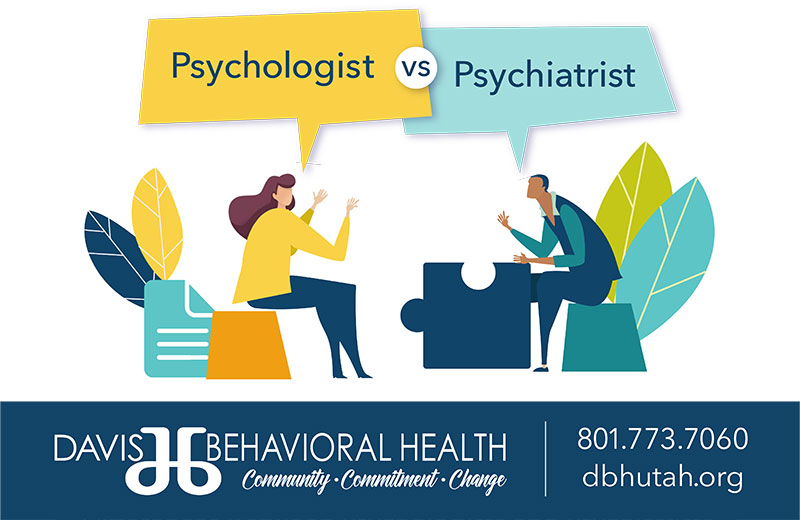Finding a mental health practitioner who can help with your treatment journey can feel complicated, but it really comes down to who you feel most comfortable with. If you’re just starting to look for a professional therapist, you may be confused about the many different titles out there. Psychologist? Psychiatrist? What is the difference and which is right for you? Read on to find out more about each of these professions and which option may be the best fit for your specific mental health needs.
What Is a Psychologist?
A psychologist is a mental health professional who works with those dealing with mental health diagnoses or conditions. When you attend an appointment with a psychologist, he or she may study the way you behave, think and interact with other people, as well as your daily environment. Doing so can give a psychologist the ability to create a personalized treatment plan that addresses your unique and individual issues.
Most psychologists look for patterns in their clients’ behaviors and thought processes to help them understand and even predict how and why a person behaves the way they do. In addition, psychologists diagnose mental disorders, create treatment plans and work with medical professionals and social workers, when needed, to obtain additional resources for their clients.
What Is a Psychiatrist?
Psychiatrists are similar to psychologists in that they diagnose and treat individuals living with mental health conditions ranging from temporary and minor to chronic and severe. They often utilize similar types of research-based therapies used by psychologists, as they observe and monitor patients’ thinking, behavior and relationships to determine the best ways to treat a variety of mental health conditions. In addition to regular therapy, psychiatrists can also perform urgent care for mental illness crises, help with management of long-term diagnoses and admit patients to hospital care settings when necessary.
What Are the Differences Between Psychologists and Psychiatrists?
Because psychologists and psychiatrists have such similar sounding names, and because they perform similar mental health services, many people get the two professions confused. There are a few main differences between the two in their training as well as who and how they treat.

Training and Education
Both psychologists and psychiatrists undergo many years of education before becoming licensed in their respective professions. Psychologists usually require at least six years of higher education, including a bachelor’s degree and a master’s degree. Many go on to earn a doctor of philosophy degree (PhD), which is usually an additional two to four years of education. While psychologists with doctorate degrees are often referred to as “Dr.,” they are not medical doctors. Once licensed, most psychologists have to complete regular continuing education and special training based on their specialties as well as new breakthroughs in psychology.
Psychiatrists are licensed medical doctors (MD). They usually have at least 11 years of education, including undergraduate degrees, medical school and further training as doctors before specializing in psychiatry. Because they have a medical license and degree(s), psychiatrists must know and understand the entire body and its functions, as well as mental health conditions.
Treatment Types
Psychologists and psychiatrists talk with their patients about their challenges and help find treatment options, but the way in which they do so differs. Psychologists focus on a patient’s behavior patterns. They may ask their patients to track their behaviors, anxieties or symptoms to determine how to best change those patterns to relieve mental illness symptoms. They may use methods such as cognitive behavioral therapy, mindfulness therapy or talk therapy to help patients improve their mental well-being.
Psychiatrists also look at the behavior patterns of their patients, but they may use different types of treatment relating to biology and neurochemistry. Some of those treatments may include brain stimulation, medication and physical examinations to determine if something physical is causing a mental condition.
Ability to Prescribe Medication
Because of the additional education and training that psychiatrists receive, most specifically medical school, they can prescribe medication for the treatment of mental health disorders. Most psychologists cannot do so. However, some states allow psychologists to obtain additional qualifications so that they can write prescriptions.
Conditions Treated
Generally speaking, psychologists and psychiatrists both treat individuals dealing with mental health concerns. However, psychologists usually treat conditions that are not as severe and may not require medication, such as mild depression, behavioral concerns or learning difficulties. On the other hand, psychiatrists often treat those with more severe diagnoses that require the use of prescription medication to control thoughts or behaviors. These conditions may include bipolar disorder, schizophrenia or chronic severe depression.
Find a Psychologist or Psychiatrist Today
Whether you choose to work with a psychologist or a psychiatrist may depend on the severity of your mental health concerns, as well as how you interact with an individual therapist. Whichever you decide, contact Davis Behavioral Health today to schedule an appointment. We have a range of providers ready to help you feel better.


